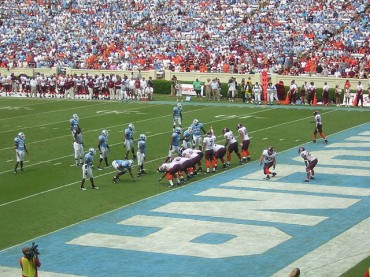
The University of North Carolina football program is preparing for the upcoming 2012 season following two disheartening years mired in academic scandal. But as it attempts to usher in to a hopeful new era, there are still signs that whole truth about those scandals is yet to be uncovered.
In 2010, the NCAA began investigating the university following accusations of improper gifts from agents to athletes. However, the investigation evolved into something much more serious when it became clear that UNC had committed the cardinal sin of the NCAA: academic fraud.
The academic fraud took place solely in the African and Afro-American studies department from summer 2007 to summer 2011. The department was responsible for 54 no-show and fraudulent classes. 67% of the classes were made up of student athletes—most were football players. Classes were either taught “aberrantly” or “irregularly,” the university admitted, following its own investigation in to the matter. The ugly details include unauthorized grade changes, forged faculty signatures on grade rolls, and limited or no class time.
In the beginning, it appeared that only the department head, Julius Nyang’oro was responsible, as well as department manager, Deborah Crowder. Both Nyang’oro and Crowder have been forced into early retirements. Later, evidence was found that academic counselors likely steered athletes towards the fraudulent classes in order to ensure their athletic eligibility. Over time, between the findings of the NCAA investigation, the university internal investigation and the prying of the media, it became clear that there were far more “rogues” involved, who collectively created the deceptive web that marred the integrity of the once-proud university.
In 2011, following UNC’s internal investigation, head football coach Butch Davis was fired in an effort to restore the image of the program. Also, the university vacated all of its wins from the 2008 and 2009 seasons due to the ineligibility of players who played in those games. The university cut the number of available athletic scholarships by three, paid a self-imposed $50,000 fine, and is now serving two years of probation. The NCAA responded by reducing twelve more scholarships, adding a year to the university’s probation, and a one-year post-season ban.
By the time of the 2012 preseason, the UNC Tar Heels and their new coach Larry Fedora seemed to be moving on from the scandals. At that time an alleged transcript of former UNC standout defensive end and NFL future Hall of Famer Julius Peppers surfaced on the UNC website and aroused suspicion of academic fraud. Peppers had 1.824 GPA, but his highest marks came in courses in the now-infamous African and Afro-American Studies department.
Former North Carolina Governor Jim Martin has since been hired by the university to lead an independent review of the AFAM department in the years prior to 2007 to determine if any “additional academic irregularities” took place.
Sadly, for many who follow college football, the UNC scandal sounds all too familiar, echoing other high-profile NCAA football scandals that have hit the headlines within the last year.
The initial 2010 investigation at UNC was sparked by the professions of a fan on an online message board similar to the way that former Arkansas coach Bobby Petrino’s scandal began this spring. And like the sex scandal at Penn State, academic fraud at North Carolina was a result of a high-profile, and lucrative football program being prioritized above the academic issues that universities are obligated to protect and see through.
The universities involved deserve blame for their part in these embarrassing scandals. The NCAA appears outraged every time a new scandal surfaces. However, with so many scandals in the news this year, fans of college football may now begin to wonder if the NCAA lacks sufficient oversight. It may be that the NCAA’s lack of oversight and rules enforcement is at least partly to blame for the widespread collegiate injustice and shame of 2012.
Fix Contributor Blake Baxter is a student at Eureka College.
Click here to Like The College Fix on Facebook.





Please join the conversation about our stories on Facebook, Twitter, Instagram, Reddit, MeWe, Rumble, Gab, Minds and Gettr.